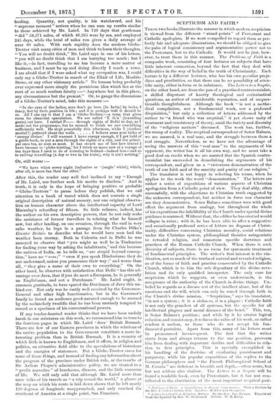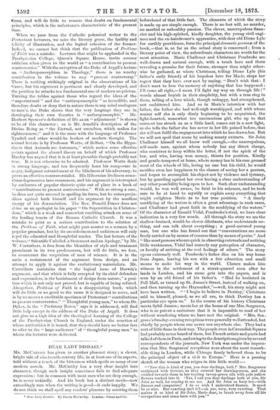SCEPTICISM AND FAITH.* THESE two books illustrate the manner in
which modern scepticism is viewed from the different " stand-points" of Protestant and Catholic apologists. If we were compelled to regard them as per- fectly fair and adequate illustrations, we should be obliged to give the palm of logical consistency and argumentative power not to the Protestant, but to the Catholic. It would not be just, how- ever, to treat them in this manner. The Problems of Faith is a composite work, consisting of four lectures on subjects that have little inherent connection, beyond the fact that they deal with difficulties in the way of belief in the truth of Christianity. Each lecture is by a different lecturer, who has his own peculiar preju- dices and proclivities, so that there can be no possibility of scien- tific unity, either in form or in substance. The Letters to a Sceptic, on the other hand, are from the pen of a practised controversialist, a skilled disputant of knotty theological and ecclesiastical questions, an author of considerable reputation, and of unques- tionable thoughtfulness. Although the book " is not a metho- dical compilation, nor a fundamental work, nor a profound disquisition," but only a collection of letters addressed by the author to "a friend who was sceptical," it yet shows unity of treatment and consistency of theory, amid the variety and diversity of the "religious matters" discussed. The work has, further, the stamp of reality. The sceptical correspondent of Senor Balmer, we are assured, is a real man, and the struggle between them a real struggle. Nevertheless, as we have not the advantage of seeing the answers of this "real man" to the arguments of his opponent, the writer has it all his own way, and we must take a good deal on credit when we are assured that the Spanish contro- versialist has succeeded in demolishing the arguments of his correspondent, and given us a "victorious demonstration of the truth of our faith and of the sanctity and purity of our religion."
The translator is not happy in selecting his terms, when he applies to the work the word "demonstration." The letters are rather a series of expositions of various aspects of Christian apologetics from a Catholic point of view. They deal ably, often successfully, with the objections to Christian truth suggested by the unknown correspondent, but neither in form nor character are they demonstrative. Senor Balmes sometimes uses with good effect the argument from analogy, but throughout the whole of his expositions the infallibility of the Church under special divine guidance is assumed. Without that, the edifice he has erected would collapse in ruins ; with it, he has been able to offer a suggestive and occasionally profound series of letters on dogmas of Christ- ianity, difficulties concerning Christian morality, social relations under the Christian system, philosophical theories antagonistic to revealed religion, and numerous specific doctrines and practices of the Roman Catholic Church. When there is such diversity of subjects, there is no room for systematic treatment of fundamental principles. The writer's first interest is the vin- dication, not so much of the truths of natural and revealed religion, as of the forms of faith and practice consecrated by the Catholic Church, which is to him the sole depositary of the divine reve- lation and its only qualified interpreter. The only cure for scepticism which he suggests, or even understands, is the acceptance of the authority of the Church in divine things. Un- belief he regards as a disease not of the intellect alone, but of the emotions and the will, which can only be cured through faith in the Church's divine mission. "Scepticism," says his translator, "is not a system ; it is a sickness, it is a plague ; Catholic faith is not only the grandest of all systems, but the specific for all intellectual plagues and moral diseases of the heart." This, too, is Senor Balmes's position ; and while by it he attains logical cohesion and consistency, it reduces the value of his work, or rather renders it useless, to those who do not accept his fun- damental postulate. Apart from this, many of his letters must be pronounced inconsequent. The fact that the writer starts from and always returns to the one position, prevents him from dealing with important doubts and difficulties in rela- tion to first principles. This is specially exemplified in his handling of the doctrine of everlasting punishment and purgatory, while his popular expositions of the replies to the German philosophers and " the French Philosophical School of M. Cousin " are deficient in breadth and depth,—often acute, but but not seldom also shallow. The Letters to a Sceptic will be found a readable book, even by Protestants, but it has not con- tributed to the elucidation of the most important sceptical posi-
• Pr•oblenu of Faith: a Contribution to Pre-sent Controrn•aies. With a Preface by the Rev. .1.0swald Dylces. D.D. Loudon: Hodder and Stoughton.
• Letters to a Sceptic on Religious Natters. By the Bey. Jan. BtImes. Translated from the Spanish by Rev. W. McDonald Dublin: W. B. Kelly.
lions, and will do little to remove that doubt on fundamental principles, which is the unfortunate characteristic of the present time.
When we pass from the Catholic polemical writer to the Protestant lecturers, we miss the literary grace, the facility and felicity of illustration, and the logical cohesion of the former. Indeed, we cannot but think that the publication of Problems of Faith was a mistake. Lectures that might be applauded in the Presbyterian College, Queen's Square House, invite severer criticism when given to the world as " a contribution to present controversies." With the exception of the Duke of Argyll's lecture on "Anthropomorphism in Theology," there is no worthy contribution in the volume to any " present controversy." There is nothing strikingly original in the observations of his Grace, but his argument is pertinent and clearly developed, and the position he attacks is a fundamental one of modern scepticism. Turning the tables against those who regard the ideas of the 'supernatural " and the "anthropomorphic " as incredible, and therefore doubt or deny that in nature there is any mind analogous to man's, the Duke shows that the very language they use in developing their own theories is " anthropomorphic." Mr. Herbert Spencer's definition of life as an " adjustment " is shown to be of this character ; so is Mr. Arnold's description of the Divine Being as " the Eternal, not ourselves, which makes for righteousness ;" and it is the same with the language of Professor Tyndall and other would-be leaders of modern thought. The second lecture is by Professor Watts, of Belfast, " On the Hypo- thesis that Animals are Automata," which makes some effective points against the absurd theory on behalf of which Professor Huxley has argued that it is at least plausible though probably not true. It is not otherwise to be admired. Professor Watts deals in strong language, and too frequently loses his composure in angry, indignant astonishment at the blindness of his adversary, to prove an effective controversialist. his Hibernian liveliness some- times degenerates into coarseness, and his argument is interrupted by outbursts of popular rhetoric quite out of place in a book of " contributions to present controversies." With so strong a case, Redoes not quite succeed in spoiling its force, but he raises preju- dices against both himself and his argument by the needless energy of his denunciation. The Rev. Donald Fraser does not shine as an apologist in his paper " On Superstition in Christen- dom," which is a weak and somewhat rambling attack on some of the leading tenets of the Roman Catholic Church. It was a mistake to print as a serious contribution to the solution of the Problems of Faith, what might pass muster as a sermon by a popular preacher, but by its onesidedness and unfairness will only repel the educated and thoughtful reader. The last lecture of the -volume," Scientific Unbelief, a Statement and an Apology," by Mr. W. Carruthers, is free from the blemishes of style and treatment prominent in its two predecessors, but will do little, we fear, to counteract the scepticism of men of science. It is in the main a restatement of the argument from design, and an attempt to apply it against the evolutionary materialists. Mr. Carruthers maintains that " the logical issue of Darwin's argument, and that which is fully accepted by its chief defenders and expounders, is the banishment of design from nature," a posi- tion which is not only not proved, but is capable of being refuted. Altogether, Problems of Faith is a disappointing book, which will do little or no good to the cause it is designed to serve, and is by no means a creditable specimen of Protestant " contributions to present controversies." " Thoughtful young men," to whom Dr. Dykes, in the " Prefatory Notes," says it is addressed, will find little help except in the address of the Duke of Argyll. It does not give us a high idea of the theological learning of the College of the Presbyterian Church in England, under the sanction of whose authorities it is issued, that they should have no better fare to offer to the " large audiences " of " thoughtful young men " to whom the lectures were delivered.







































 Previous page
Previous page